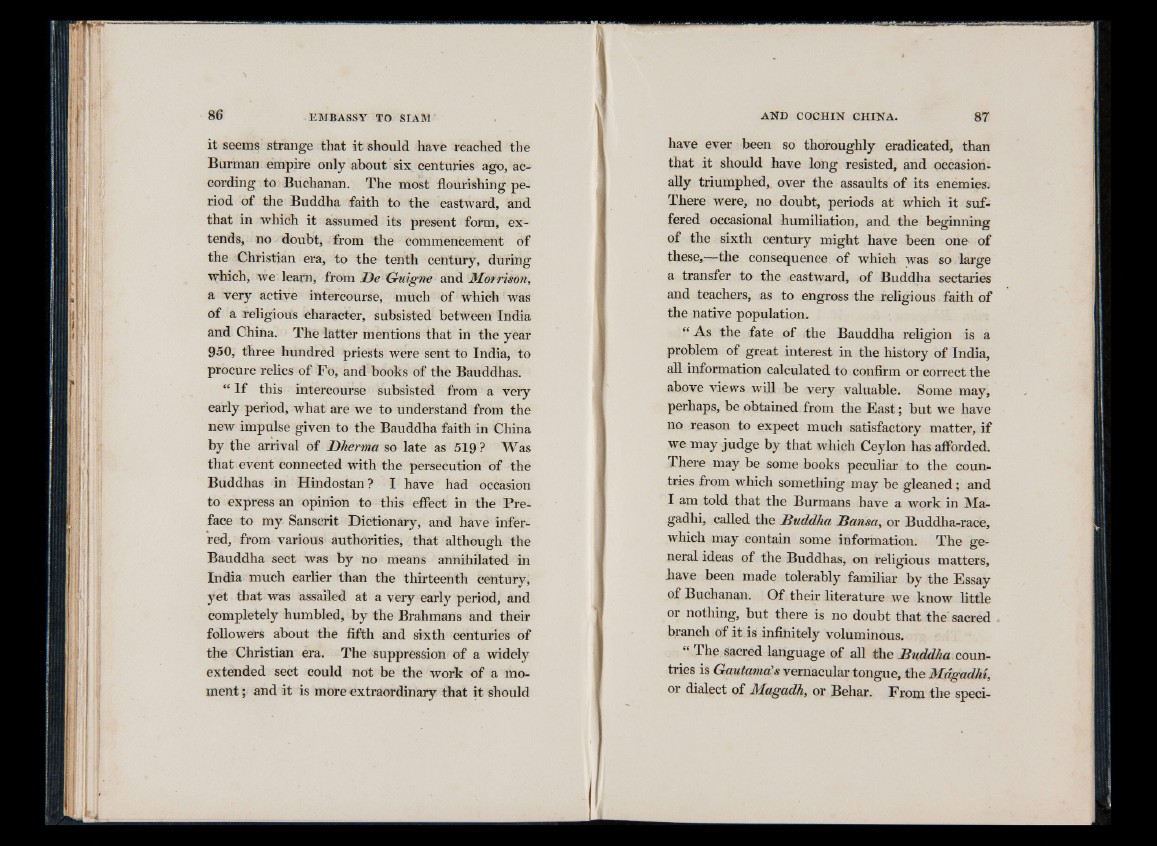
it seems strange that it should have reached the
Barman empire only about six centuries ago, according
to Buchanan. The most flourishing period
of the Buddha faith to the eastward, and
that in which it assumed its present form, extends,
no doubt, from the commencement of
the Christian era, to the tenth century, during
which, we learn, from De Guigne and Morrison,
a very active intercourse, much of which was
of a religious character, subsisted between India
and China. The latter mentions that in the year
950, three hundred priests were sent to India, to
procure relics of Fo, and books of the Bauddhas.
“ I f this intercourse subsisted from a very
early period, what are we to understand from the
new impulse given to the Bauddha faith in China
by the arrival of Dherma so late as 519 ? Was
that event connected with the persecution of the
Buddhas in Hindostán? I have had occasion
to express an opinion to this effect in the Preface
to my Sanscrit Dictionary, and have inferred,
from various authorities, that although the
Bauddha sect was by no means annihilated in
India much earlier than the thirteenth century,
yet that was assailed at a very early period, and
completely humbled, by the Brahmans and their
followers about the fifth and sixth centuries of
the Christian era. The suppression of a widely
extended sect could not be the work of a moment
; and it is more extraordinary that it should
have ever been so thoroughly eradicated, than
that it should have long resisted, and occasionally
triumphed, over the assaults of its enemies.
There were, no doubt, periods at which it suffered
occasional humiliation, and the beginning
of the sixth century might have been one of
these,—the consequence of which was so large
a transfer to the eastward, of Buddha sectaries
and teachers, as to engross the religious faith of
the native population.
“ As the fate of the Bauddha religion is a
problem of great interest in the history of India,
all information calculated to confirm or correct the
above views will be very valuable. Some may,
perhaps, be obtained from the E a s t; but we have
no reason to expect much satisfactory matter, if
we may judge by that which Ceylon has afforded.
There may be some books peculiar to the countries
from which something may be gleaned; and
I am told that the Burmans have a work in Ma-
gadhi, called the JSuddha Sansa, or Buddha-race,
which may contain some information. The general
ideas of the Buddhas, on religious matters,
have been made tolerably familiar by the Essay
of Buchanan. Of their literature we know little
or nothing, but there is no doubt that the sacred
branch of it is infinitely voluminous.
“ The sacred language of all the Buddha countries
is Gautama's vernacular tongue, the Mágadhí,
or dialect of Magadh, or Behar. From the speci